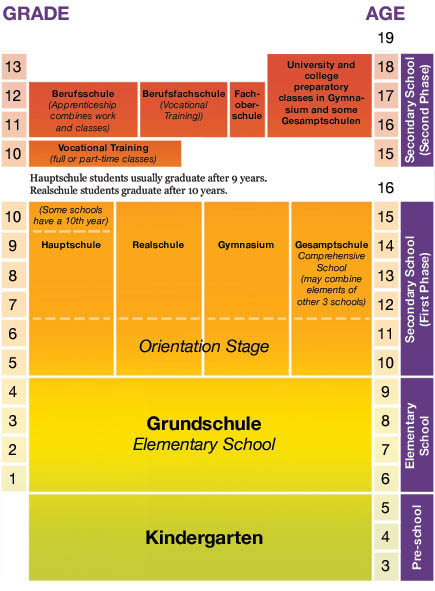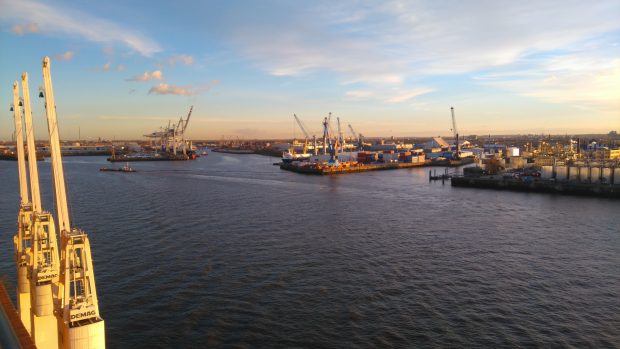Posted by Irina Gavrilova on behalf of
Lauren Thompson
English Language Assistant in Hamburg, Germany
On leave from the Germanic Studies Master’s program at UVic
In spring of this year, I found out that I would yet again be going to Germany to work at a school as an English assistant through the Pedagogical Exchange Service (Pedagogischer Austauschdienst or PAD). This would be my second time doing so and I was excited for the opportunity to live in Germany again and work with young people there. However, I was shocked to find that I would be sent to the opposite side of the country this time. Whereas my first time was in a “city” of 6000 on the border with Austria near Salzburg – deepest Bavaria – this time I was being sent to the northern city of Hamburg, the second largest city in Germany! I thus had to acclimatize myself to living in the Hafenstadt, the harbour city.
View of the River Elbe and the Port in Hamburg.
Now, I don’t actually live and work in central Hamburg, but rather in Harburg, a smaller city to the south of Hamburg. Although it is considered part of Hamburg, many staunchly claim that “Harburg is not Hamburg”. It is not unlike when people from Vancouver say that “Burnaby isn’t Vancouver” or, for Victoria, say that “Sidney isn’t Victoria”. For me, the jury is still out and I still easily travel to and from central Hamburg.
Moving
Moving to Germany involved a lot of ups and downs. Apartment hunting in Hamburg is not too easy – it is one of the more expensive cities in Germany and most people want to meet you in person – something that is difficult if you are searching from Canada. I had a sublet for my first three weeks and, during that time, I found an excellent room in an apartment with an awesome roommate.
Once on the ground, it was a bit of a struggle to figure out the bureaucracy that is involved with moving – it had changed since my last time here. When you move to Germany you are obligated to register yourself at city hall, find a bank, and, if you are a non-EU citizen like me, you have to then apply for a residency permit. Thankfully the PAD provides documents to help with this process and, if you’re lucky like I am, contacts from the school you work at help out. My struggle this year was with banks and changes in policy. For registration city hall required an extra form that was not necessary my last time here and Hamburg is so busy that you need to book an appointment way before time – this made registering a little more chaotic than I’d even expected. For banks, every one that I went to requested a residency permit even though I was already legally in Germany (Canadians can stay 90 days without a residency permit). It would also take a while to receive my residency permit* so I kept trying and finally got an account almost three months after arriving in Germany – talk about stress! I was lucky that I had a bit saved up.
My Work!
My school is a Stadtteilschule, something that only exists in Hamburg. They are a kind of combined school (Gesamtschule) that runs parallel to the traditional three-tiered German school system. Here it gets altered a bit. My school only teaches until the tenth grade and some students leave after the ninth grade. If students do well on their tenth grade exams, they continue on at another school to complete exams that allow them to go to university.
Diagram of the German school system. My school lines up best with a Gesamtschule but only offers the Realschule and Hauptschule exams. (Image from http://toridykes.com/blog/2014/2/18/an-overview-of-the-german-educational-system)
 English is a part of the exams that the students take in the 9th and 10th grade, so I am here to help them practice speaking with a native English speaker and just generally assist with English classes. I read with them, chat with them, facilitate discussion and take part in other aspects of their school life like presentation and exam preparation. We also decided to have a non-credit challenge “course” for those who are doing particularly well, this is meant to introduce them to language and themes that don’t come up in their normal classes and further their English knowledge. I’m including a fair amount of Canadian content to, hopefully, make it more interesting. In addition to all this, I hope to help a bit with some social studies courses as they learn parts of Second World War and Holocaust history. The topic is part of my specialization at UVic and so hopefully I can help to communicate it to our students.
English is a part of the exams that the students take in the 9th and 10th grade, so I am here to help them practice speaking with a native English speaker and just generally assist with English classes. I read with them, chat with them, facilitate discussion and take part in other aspects of their school life like presentation and exam preparation. We also decided to have a non-credit challenge “course” for those who are doing particularly well, this is meant to introduce them to language and themes that don’t come up in their normal classes and further their English knowledge. I’m including a fair amount of Canadian content to, hopefully, make it more interesting. In addition to all this, I hope to help a bit with some social studies courses as they learn parts of Second World War and Holocaust history. The topic is part of my specialization at UVic and so hopefully I can help to communicate it to our students.
The Hansestadt
Hamburg is a Hansestadt or a “Hanseatic City”, meaning it used to be part of the Hanseatic League that dominated trading in Northern Europe. Many of the places included in the Hanseatic League were port cities, like Hamburg. Because of this, the letters on the license plates here are “HH” or Hansestadt Hamburg. A lot of the sights in Hamburg relate to the trading and maritime history in Hamburg and it remains a major port. South of the Elbe but Northwest of me in Harburg, you can see the massive cranes that load containers on and off of the ships. Since it is so flat here, they stand out along the horizon.
There are, of course, many things to too in Hamburg and currently the many Christmas markets and the snow (!) make the city delightful and festive. Hopefully I’ll get around to sharing some of the sights from Hamburg, more about my daily life, and detail some of my trips throughout Europe!
Until my next post,
Lauren
* I do, as of early December, have a residency permit.
